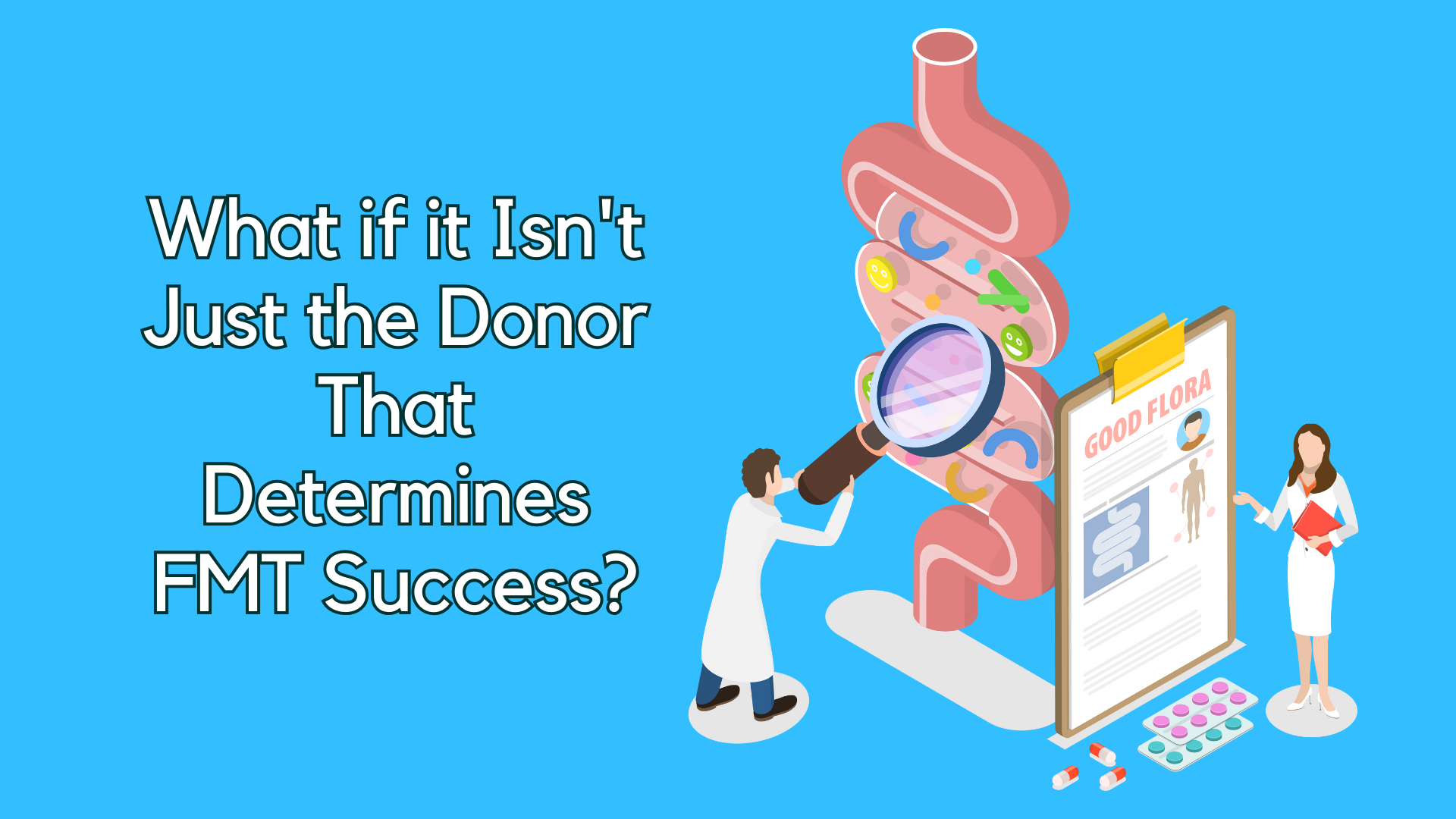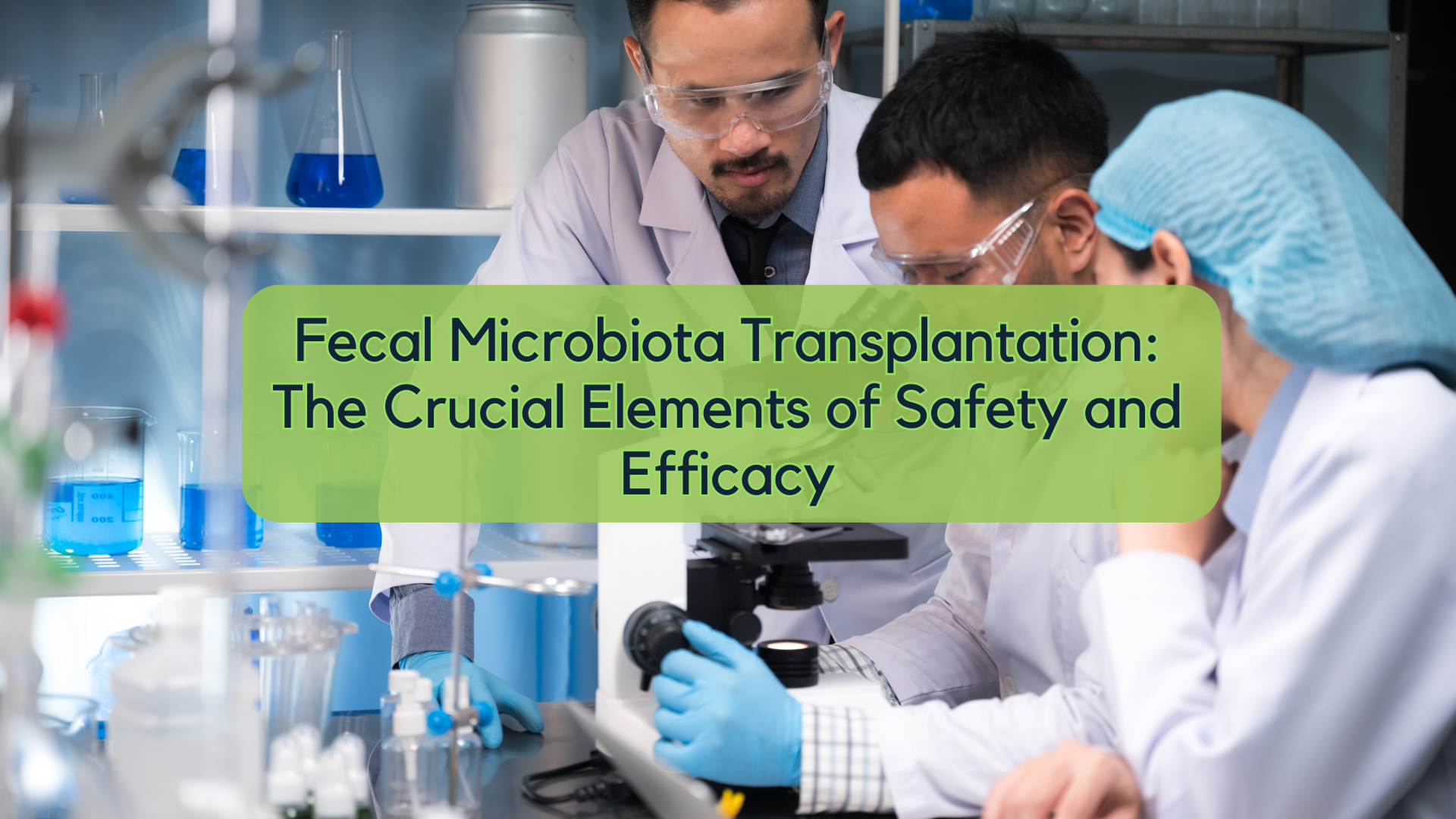While the commonly held belief is that the better the donor (or super donor), the better the success of FMT, a new study in Nature Medicine indicates that it may be the recipient’s microbiome and not that of the donor that primarily determines the outcomes of FMT1 (You can access the study here). Fecal microbiota transplantation (FMT) is the infusion of specially prepared stool material from a healthy donor(s) into the gut (intestinal tract) of a recipient to restore a healthy and stable microbial community and confer health benefits and/or treat a specific disease or symptom(s)2–5 (learn more about FMT here). While the use of FMT is growing2,5–8, the mode of action and what leads to clinical success or failure is poorly understood9. We know that donors play an essential role in the success of FMT, with a shift in the gut microbiome of a recipient towards that of the donor used as a measure of FMT success10,11. This new study suggests that it might actually be the pre-treatments done to the recipient’s microbiome before FMT which play a primary role in the outcomes and engraftment of FMT1.
Schmidt et al. looked at 316 pre- and post-FMT samples across 10 disease indications to understand the dynamics of different microbial factors of the recipient and donor and how they impacted FMT outcomes1. Their main finding was that the recipient's species richness, the types of “gatekeeper” species in the gut and how different or similar a recipient's gut microbiome was from a donor's were the major factors in determining engraftment and overall outcomes of FMT1. To simplify, they found that how a recipient’s gut microbiome looked before FMT and how different it was from the donor impacted the success of FMT.
So, how does this study support the use of pre-treatments, such as antibiotics, before undergoing FMT?
Pre-treatment (or microbiome prep) helps to prepare the gut microbiome by reducing species richness and which microbiota are dominant before FMT, which can then allow for better engraftment of the donor microbiome and, therefore, better outcomes post-FMT. Schmidt et al.’s study highlights the impacts of pre-treatment with antibiotics and the possible benefits for FMT when comparing patient outcomes of those treated for recurrent Clostridioides difficile infection (rCDI). Patients treated for rCDI showed a higher success rate of FMT than any other conditions included in the study1. They found that over 90% of patients with rCDI received antibiotics before FMT (pre-treatment), while most patients for other indications did not, which suggests that the high rates of FMT success in patients with rCDI may be due in part to the use of antibiotics before FMT1.
This is an exciting finding, as pre-treatment for FMT is often used to help prepare the gut microbiome to ensure increased donor engraftment, yet clinical support for this practice was unclear. In support of Schmidt’s findings, a recent 2021 study applying FMT in children with autism spectrum disorder (ASD) showed rather lacklustre results compared to the work published by Dr. James Adam’s group from Arizona State University12,13, and it could be concluded that differences stem from lack of pre-treatment before FMT in the 2021 study (Learn more about the research around FMT in children with ASD here). Li et al. performed a 12-week protocol, including 4 weeks of FMT and an 8-week follow-up period (You can access the study here.) They found that GI symptoms improved by 35% and that autism-related behaviour showed a 6% reduction13, in contrast to the findings by Kang et al., reporting a 77% and 23% improvement in GI symptoms and autism-related behaviours, respectively12. This new study stands out because no pre-treatment, either antibiotics or proton pump inhibitors, was performed before FMT13. Based on Schmidt et al.’s study, which showed that the recipient’s microbiome before FMT plays a primary role in the outcomes of FMT, this lack of pre-treatment may have impacted the magnitude and duration of improvements reported in Li et al.’s study1,13.
So, what does this all mean?
The major takeaways are:
1. The recipient's microbiome is as or more important than the donor’s for FMT success1.
2. Pre-treatment before FMT to prepare the recipient’s gut microbiome can help improve FMT success1,12,13
3. The role of recipient/donor matching, that is, how similar or different they are, is a significant factor in determining FMT outcomes1.
It is important to remember that for donor microbiota to thrive and survive in an entirely new gut microbiome is no simple feat, so giving donor microbiota the best chance by reducing barriers of engraftment in the recipient’s gut via pre-treatment with antibiotics is a logical step1,13.
At Novel Biome, we're passionate about the importance of the gut microbiome and the transformative potential of Fecal Microbiota Transplantation (FMT) treatment to restore health. As an FMT contract manufacturer, we leverage our years of experience in FMT to manufacture high-quality FMT products utilizing our highly-screened donors and stringent manufacturing standards. If you are interested in learning more about our FMT products and manufacturing capabilities, please contact us HERE or to register as a clinical partner to order FMT products, click HERE.
References: 1. Schmidt, T. S. B. et al. 2022, 2. Choi, H. H. & Cho, Y.-S. 2016, 3. Gupta, S. et al. 2021, 4. Ser, H.-L. et al. 2021, 5. Xu, M.-Q. 2015, 6. Allegretti, J. R. et al. 2019, 7. Brandt, L. J. & Aroniadis, O. C. 2013, 8. Rinott, E. et al. 2021, 9. Hanssen, N. M. J. et al. 2021, 10. Kump, P. et al. 2018, 11. Wilson, B. C. et al. 2019, 12. Kang, D.-W. et al. 2017, 13. Li, N. et al. 2021.


 By: Dr. Shaina Cahill, Ph.D. (Director Of Operations and Medical Affairs)
By: Dr. Shaina Cahill, Ph.D. (Director Of Operations and Medical Affairs)





